|
– Part 1: Introduction and films 1-4 –
I can't remember precisely when I first encountered the cinema of the once hugely popular British stage and screen actor, Tod Slaughter, but know for a fact it was via TV screenings of his first two features, Maria Marten, or the Murder in the Red Barn and Sweeney Todd: The Demon Barber of Fleet Steet. What did I think of them? All these years later, I really couldn't say. I do remember that the quality of the prints and transfer were shoddy, even by the standards of cathode ray tube era television. And I was still in my teens then and had yet to develop even half-decent critical skills. What did stay with me was one particular aspect of Slaughter's performance – that he could chew the scenery like no other actor I had ever seen.
Years later, I became friends with a character actor who specialised in pantomime villains, and he adored Slaughter to the point of regarding him as an unofficial mentor. Given my friend's talent for audience-pleasing, over-the-top stage villainy, I found it easy to see why, at least at the time. It's also through him that I learned, to my surprise, that 'Slaughter' was not a stage-name chosen by the actor to trade on his penchant for playing evil villains, but his actual surname. Indeed, he was born Norman Carter Slaughter, and given the occupational, locational, or historical origin of so many English family names, I can't help wondering just how that particular surname originated. He was also a stage actor of many years standing who ran his own theatre company – where he often played the hero rather than the villain – before the movie business came knocking.
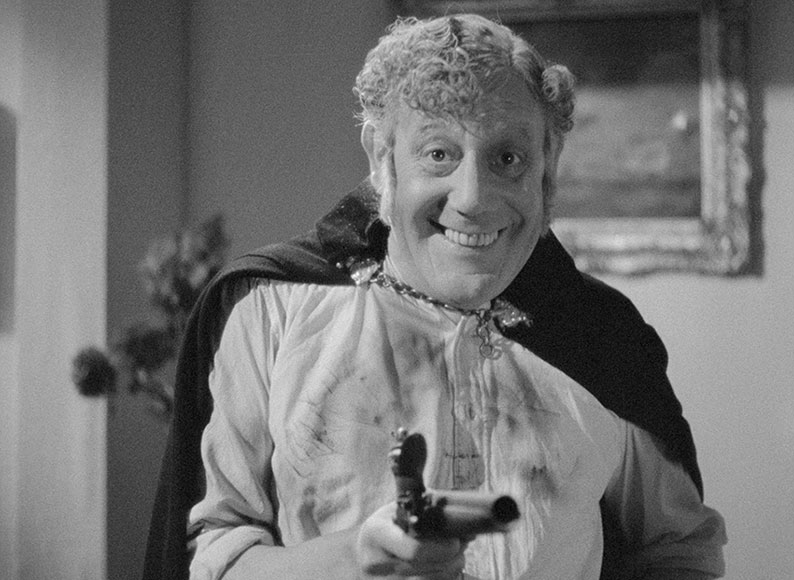
In the years since then, Slaughter had effectively fallen off my radar. Then came the announcement that a box set containing a staggering eight of the actor's films was to be released on Blu-ray, and I found myself wondering what the people at Indicator had been smoking. I'll be honest and admit that I fully expected to have this review done and dusted in little more than a week, but when I watched the films, something unexpected happened. These movies weren't comically bad, as my failing memory had convinced me they would be, they were really well made, and Slaughter's performances, whilst sometimes every bit as barnstorming as I remember, were often so much more than that. And what fun these films are, and not remotely in a 'so bad they're good' way. Slaughter was an entertainer who clearly relished playing the bad guy, and while also capable of subtle villainy, he was never afraid to really push the boundaries.
Many will claim that Slaughter has no modern equivalent, and with good reason. Yet I'd humbly suggest – and go with me on this – that something of his spirit lives on in none other than Nicolas Cage. This is in no way intended as a slur on Cage, who has proved himself over and over again to be an actor or considerable skill, remarkable range and real screen presence. But think what we tend to remember him most frequently for. Is it his Oscar-winning turn as a self-destructive alcoholic in Leaving Las Vegas, his super-cool turn as Sailor Ripley in David Lynch's Wild at Heart (1990), or his superb portrayal of a truffle hunter in search of his stolen animal in Michael Sarnoski's Pig? Sometimes, sure, but too often it's him screaming manically, "The bees! The bees!" in the remake of The Wicker Man, and there are many more examples of what happens when you let Cage off the leash and encourage him to run with the role. And we love him for it, but remain ever aware that he can and often does deliver far more nuanced performances. In Panos Cosmatos's Mandy (2018) and Richard Stanley's Color Out of Space (2019) we're treated to his entire range, with Cage compellingly low-key in the early scenes, only to gloriously let rip as the respective stories progress. Again, this is in no way intended as a put-down of Cage, but a testament to the high regard in which I now hold Mr. Slaughter.
As soon as I started watching the movies, I knew this set was going to take me far longer to review than I had ever expected, but that's not all that this release has to offer. All eight films have commentary tracks by well-regarded genre experts who also happen to be enthusiastic fans of the actor's work. On top of that, there are featurettes, interviews, short films, and galleries, and every one of the films has been lovingly restored, transforming them from the bargain basement cheapies they once appeared to be into classy productions that bely their sometimes insanely low budgets.
So yes, this review is unforgivably late and by thunder it's long, but to cover this set in just a few paragraphs would be unforgivable in my eyes. And if you've spent any time on this site, you'll know that we don't do things by halves, however long it takes. Right, over to you Tod, my boy!
| MARIA MARTEN, OR THE MURDER IN THE RED BARN (1935) |
|
| |
|
| |
"If you'll meet me at the Red Barn as sure as I have life
I will take you to Ipswich Town and there make you my wife."
This lad went home and fetched his gun, his pick-axe and his spade.
He went unto the Red Barn and there he dug her grave.
With her heart so light she thought no harm, to meet her love did go
He murdered her all in the barn and he laid her body low." |
| |
From the folk song Maria Martin [sic] |
Young and pretty Maria Marten (Sophie Stewart) is a popular girl. She's certainly caught the eye of local squire William Corder (Tod Slaughter), with whom we see her partnered at the barn dance that he has funded and facilitated. Watching on with envious eyes from the side-lines is handsome gypsy Carlos (Eric Portman), who's in love with Maria. She, it turns out, also has eyes for him. Present at the dance is an older gypsy woman (Stella Rho) who can tell fortunes by reading a person's palm, claptrap nonsense that I'll happily buy into for the sake of the film. When we first meet her, she's assuring the Marten family's young maid Nan (Ann Trevor) that she'll meet a handsome young man, which prompts Nan to glance over at her slack-jawed boyfriend, Timothy Winterbottom (Gerard Tyrrell), and laughingly scoff. When Corder 'borrows' a threepenny bit from the gormless Timothy and offers his own hand, the woman's face darkens, and she prophesises death. Although reluctant to say more, she's pressed by Corder to do so, and her response is portentously specific. "I see a figure on the end of a rope," she tells him. "Your figure!" Startled by the old woman's prediction, Corder behaves in a manner all too typical of his wretched class by blaming every gypsy present and angrily ordering them all to leave.
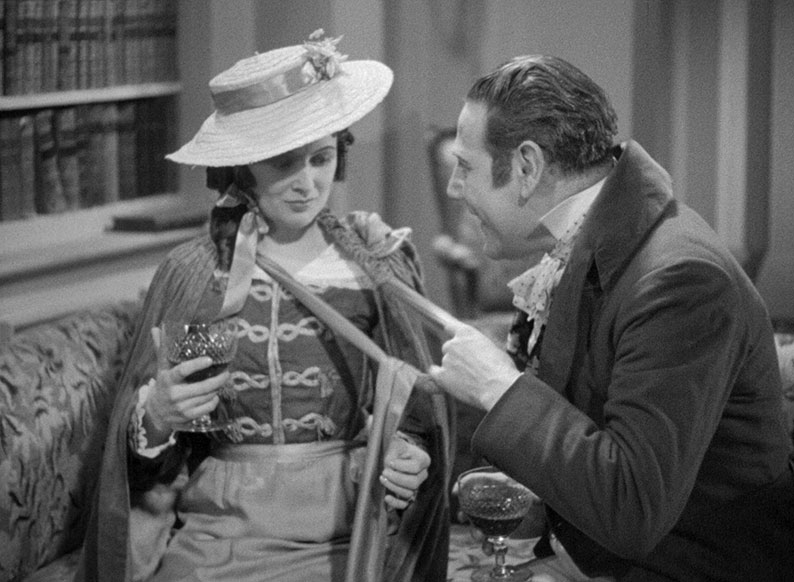
Hold up a minute. I'm all for foreshadowing, but isn't this effectively the mother of all spoilers? Well, it is and it isn't. When the dual-titled Maria Marten, or The Murders in the Red Barn was released, it was already a widely seen and hugely popular stage play, and was based on a true-life murder case that became a sensation. Just about everyone going to see this film on its release was thus already familiar with the story and how it played out. Even if you don't, as some modern viewers might, the film assumes that you do. First up, there's that title, which directly links a named character to a murder in a specific location, and from the moment that Maria first appears on screen, it seems unlikely that she'll be the one doing the killing. If that wasn't enough, the film opens with the camera in the orchestra pit of what looks like a provincial theatre performance of the play on which the film is based (it was certainly performed by Slaughter's own Elephant and Castle theatre company). Here we are introduced to the film's principal cast, which includes a masked hangman. Now what do you think his role in this particular tale might be? That said, the film still has a couple of surprises tucked up its sleeve for those new to the tale.
That evening at home, Maria (and by the way, that's pronounced Ma-rai-ah, not Ma-ree-ah) tells her mother (Clare Greet) that she's off to evening choir practice, but instead she secretly pays a visit to Corder. He's delighted to see her and promptly locks the door to keep the staff from wandering in, then offers her wine and responds to her complaints that their village is boring by offering to take her to London. Maria certainly seems taken with the idea, and when the two sit down to chat, Corder reveals how attracted he is to her and starts undoing her robe. Wait a minute, he's surely not going to…? The film then cuts away to show Maria's father Thomas (D.J. Williams) arriving home and wondering where his daughter has got to, and when it returns to Corder's house, the concerned-looking Maria is fastening the final buttons on her dress. "You do love me?" she asks Corder in what sounds sadly like a plead. "Yes, yes," replies Corder in the sort of tone you might use if you were humouring someone who had just said something preposterous. 1934 this may be, but it's clearly inferred that Corder plied the virginal Maria with drink and pressured her to let him have his wicked way with her. Does he really love her? Does he hell. Will he take her to London as promised? In a pig's eye.
On her way home Maria is confronted by Carlos, the sight of which prompts Maria's father to assume that she spent the evening with this Romany rapscallion. The agitated Thomas then pays a visit to the village magistrate to demand that these gypsies be sent on their way. How times change, eh? Unfortunately, and a tad ironically given the circumstance, the magistrate in question is the devilish Corder. While he claims that his hands are tied when it comes to the gypsies, he promises to do something about Carlos at least. He then hops off to London to gamble away the last of his money and make plans to marry into a wealthy family. Maria, meanwhile, has started feeling a little unwell, especially, I'm guessing, in the mornings…
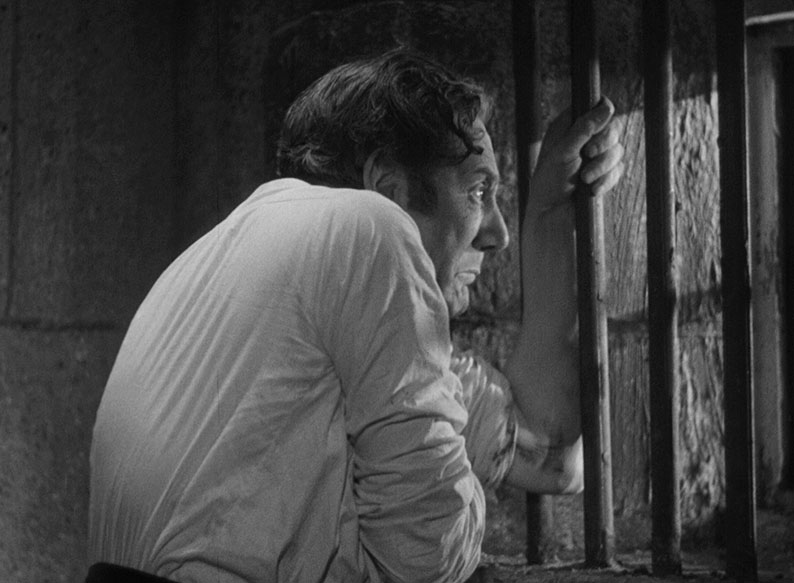
Maria Marten, or The Murder in the Red Barn was, coincidentally, both Slaughter's debut feature and the first of his films that I saw. At the time, it cracked me up, primarily for the scenery-chewing that Slaughter indulges in once Corder is unmasked and arrested for Maria's murder. Coming back to it after so many years, some elements of that first viewing remain. Slaughter still acts up a barnstorm, and the performances of a couple of the supporting players give the whole thing the feel of the provincial theatre production that the opening scene suggests it is. What caught me out was the quality of Milton Rosmer's direction. His shot choice and use of subtle, fluid camera movements is always on point – he even throws in a couple of Dutch angles when Corder is losing at dice to an aristocratic fop of a friend whilst in London. He really comes into his own when Corder lures Maria into the fateful barn of the title, creating an air of sinister menace that would not be out of place in a classic Universal horror of the period. And while I often winced at the antics of the dopey Timothy, I will give a shout for the quartet of actors playing his fellow musicians at the opening barn dance, whose comical asides are a lot more entertaining than those of their hapless young tuba player.
As for Slaughter, he still plays some scenes as if he's in a silent movie melodrama, and once Maria's body is uncovered, he really let's rip, peaking in his jail cell descent into madness. Over-the-top? Yes. But entertaining? Oh, absolutely. From the moment he first appears, Slaughter owns this film, and he does whatever is necessary to command the screen, dwarfing those around him and unafraid to push his portrayal of Corder to the limit. And not everything that entertains here involves him storming the barn. There's an Abbot and Costello-like sequence in which Corder cons the dopey Timothy out of a shilling, one whose metaphorical element has a very modern sting. There's also nicely delivered sarcastic barb when Corder returns home and his grumpy butler's greets him with a cheerless, "Glad to see you back, sir," to which Corder replies dryly, "Yes, you look it." It's Slaughter's performance, the brisk direction, the darkly sinister sequences, unexpected adult turns, and the subtextual digs at upper middle-class corruption that make this such a memorable debut feature for its star. It's also a hugely enjoyable way to spend an hour of your time, and is a far better film than its former reputation might lead you to expect.
| SWEENEY TODD: THE DEMON BARBER OF FLEET STREET (1936) |
|
It probably says something about our fondness for dark and twisted tales that the most famous barber in literary history is one who murders his customers by tipping them into his cellar using a lever-operated trap door and slicing their throats with a straight razor. But that's only the half of it. Located close to this establishment and connected by an underground tunnel is the abode of a female partner-in-crime, who carves up bodies of the victims and uses the flesh to make the filling for pies that she sells in her shop upstairs. Indeed, so famous is the name of Sweeney Todd that it became cockney rhyming slang for Flying Squad, a branch of the Metropolitan Police Serious and Organised Crime unit in London. Fans of 70s TV cop shows will know it as The Sweeney.
This third film adaptation of a 19th century Penny Dreadful serial titled The String of Pearls – one that had already been performed repeatedly on the stage – feels from the off like the perfect source material for Tod Slaughter's second movie. This one was the first of several Slaughter films to be directed by Maria Marten producer George King, and features two of the earlier work's actors in key supporting roles. Although once again on a miniscule budget, it's immediately given a more expansive feel by an on-location opening shot grabbed in the real-world Fleet Street of the day. So what's going on here? An updating of the famous story, perhaps? No, we're in the realms of the framing device, as a well-to-do customer pops into the Sweeney Todd barbershop for a shave and asks about a framed sketch hanging on the wall, one that features the barber after whom the shop is still named. The barber is only too happy to tell him the story of a man he describes both as "the greatest exponent of the razor the world has ever known" and "a true artist." I'd put your coat and hat back on now and scarper, mate.
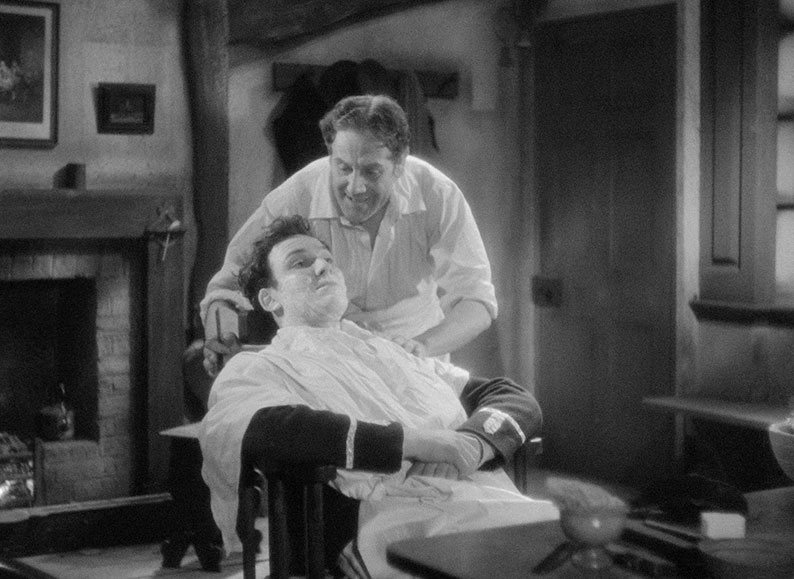
We're then transported back in time to a London dockside that was apparently just around the corner from the titular Fleet Street (last time I checked, it's a five minute walk to the River Thames from that road at best). Here we meet the titular Todd (Tod Slaughter), who is eagerly watching the loading of the cargo ship Golden Oak, which is owned by wealthy merchant, Stephen Oakley (D.J. Williams). As Todd skulks in a doorway, Oakley's pretty daughter Johanna (Eve Lister) meets with the ship's handsome first mate, Mark (Bruce Seton). The two are in love, but Johanna's father refuses to let his precious daughter have anything to do with the likes of Mark, not because of any immorality on his part, but because he comes from a poor background. I immediately began hoping that Oakley would be the first to take a trip down to Todd's cellar. No such luck. Also meeting at the dockside is Johanna's maid Nan (Davina Craig) and Mark's shipmate, Pearly (Jerry Verno), who
are clearly being painted as the comedy sidekick couple to Marc and Johanna's hero and heroine. Surprisingly little is made of this potentially goofy pairing. As Todd converses with a jovial local man, he gets to deliver the wink-at-the-audience line that will become his and, to a degree, the actor's catch phrase, as he talks about all of the men that he's had in his chair, and how he's "polished them all off." But it's when the sailors return from their voyage that they call of Todd's services. "Lovely lot of throats, the lot of them," Todd muses enthusiastically. "Beautiful throats. Rich and mellow…to a razor!" Mark and Johanna's assignation, meanwhile, is interrupted by the unexpected arrival of Johanna's father. He angrily orders Mark to board his ship, and even has a go at poor Nan before having her and Johanna transported back to the house in his coach. It turns out that Todd was the one who alerted Oakley and brought him here. He's looking to invest in Oakley's new ship, and when he reveals how much money he is willing to put up, the delighted Oakley invites him to dine with him that evening, unaware that Todd also has his eye on the far younger Johanna.
It's then that we get one of the most disturbing scenes in Slaughter's filmography, and I don't say that lightly. When Todd arrives back at his shop, waiting for him is the workhouse Beadle (Graham Soutten) with a young orphan named Tobias Ragg (Johnny Singer), who has been selected to serve as Todd's latest apprentice. It turns out that this is the eighth such boy provided by the City Master in just seven weeks, each of whom Todd has been paid a guinea for agreeing to take. What happened to the previous seven, you might ask? The Beadle certainly suspects something is up, but Todd infers that the young rascals have all run away. Knowing what most of us will know about Todd's activities even before the film elects to reveal it, the implications are genuinely monstrous. When the three enter the barbershop, the sense that young Tobias is in mortal danger is increased by the theatrically creepy manner in which Todd addresses the lad and the pervy way that he smiles at him. It's made worse by the fear clearly visible on the Tobias's face. Full marks here to young Johnny Singer, who communicates the young boy's terror of his new master without a whisper of Slaughter's colourful expressionism. When the Beadle departs, Todd makes sure that Tobias understands the potential consequences of giving him any trouble, grinning like a ghoul as he brandishes a straight razor and tells Tobias of a barbershop boy who had his tongue cut out for letting it wag too much. The poor kid looks absolutely petrified at this. Todd then gives the boy a penny and sends him next door to buy a pie from Mrs. Lovatt (Stella Rho – an odd, single-letter change from the original, Mrs. Lovett). Putting aside the fact that the pie Tobias buys for a penny would cost you a at least a fiver today, knowing what we know, there's a strong possibility that this kid is eating human flesh with a crust on top! And maybe even the flesh of one of his young predecessors! Jeez, this story is so messed up.
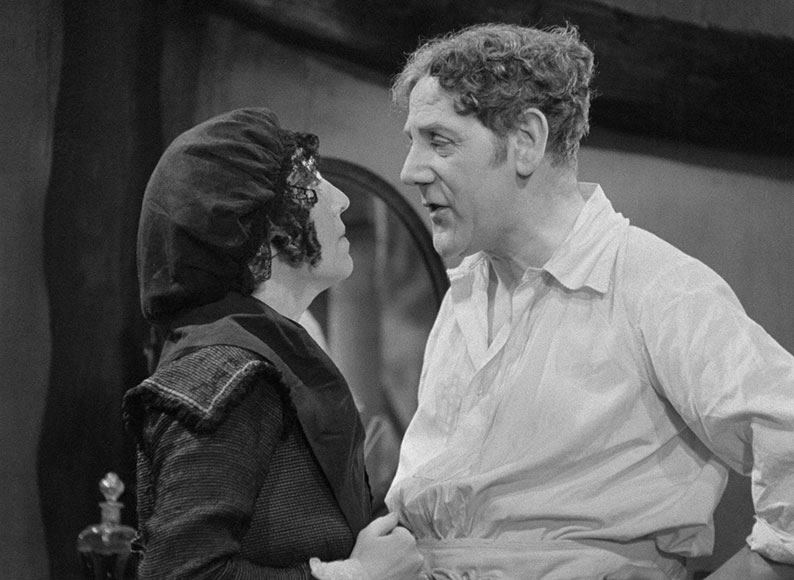
Given the age of the film, it's hardly surprising that the grislier aspects of the story take place off-screen, or in the case of what goes into Mrs. Lovatt's pies, are not mentioned at all. Indeed, so problematic must the whole topic of unwitting cannibalism have been for a film back in 1936 that the filmmakers choose to rely instead on audience familiarity with the tale and a couple of jokey nudges (Pearly tucking into one of the pies and wondering what's in it) to subtly infer what dare not be said out loud. Once again, Slaughter dominates, and the film is certainly at its most entertaining when he is on screen. It could certainly have done without the midway interlude to follow Mark on board the Golden Oak as it approaches and makes landfall at an African outpost run by a white man named Trader Patterson (Aubrey Mallalieu). I mention his skin colour because time has not been kind to this segment of the film. First up, there's the fact that Patterson has an obedient black servant that I've no doubt the old white racist was responsible for nicknaming "Snowdrop." Then, of course, his hut is attacked by a group of black tribal locals, most of whom the all-white crew of The Golden Hope wipe out after Snowdrop (I'm genuinely wincing as I type that name) risks his life to secure their help to save his master. That this is how things used to often be in films of the period is something I can reluctantly accept. That it's an unnecessary distraction from the far more interesting story taking place back in London is a different matter. Its only real purpose is to promote Mark to the position of ship's Captain, but that could have been achieved with a caption or a line of expositional dialogue. The whole episode lasts about 11 minutes, but discomforted by it and itching to get back to Slaughter as I was, it felt a damned sight longer.
The good news is that on his return, Mark proves a likable hero whose fate I became genuinely invested in, especially when he falls foul of Todd's trapdoor chair shortly after the halfway mark. It's here that Mrs. Lovatt seems to act out of character by coming to his aid, but if you join the plot strand dots it becomes clear that her actions are not driven by compassion but self-interest and her growing distrust of her partner. The action that Mark then takes to expose Todd's secret is nicely handled and briskly staged, and despite the fact we all know how things will work out, some tension is built when Johanna finds herself locked in a cupboard inside a burning building. Whether you buy into the reason she ended up there in the first place is another thing entirely, which includes her disguising herself as… oh, you'll see.
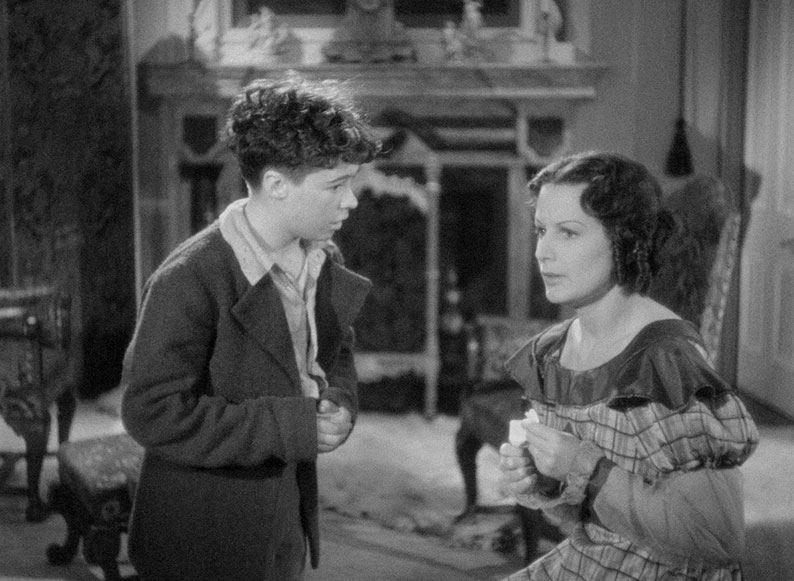
A couple of unnecessary distractions aside, Sweeney Todd, the Demon Barber of Fleet Street proves a splendid second film outing for its star. The supporting cast is excellent value, with Stella Rho and Johnny Singer shining brightest as Mrs. Lovatt and young Tobias. But ultimately and rightly it's Slaughter's show, and Sweeney Todd is a role he was frankly born to play and clearly relishes here. If there's a flaw of logic in his performance, it's that no-one with even an ounce of sense would let this man anywhere near their throat with a razor.
| THE CRIMES OF STEPHEN HAWKE (1936) |
|
Sit down for Slaughter's third feature, rubbing your hands together in anticipation for his early appearance, and the opening scene is likely to have you wondering if you've somehow put the wrong disc in the drive or selected one of the special features by mistake. Instead of a shot of Slaughter dressed in Victorian clothing, his face a picture of malevolent delight, we're in a recording studio with a posh-voiced Anglo-Australian music hall duo named Mr. Flotsam and Mr. Jetsam (real names Bentley Collingwood Hilliam and Malcolm McEachern). To Flotsam's piano accompaniment, the two sing a song of their own invention that passes dry comical comments on topical issues of the day. And when I say they sing a song, they sing the whole song. We're almost five minutes into the film before they complete it. What the hell is going on here?
It's soon revealed that this is a live radio broadcast of the sort that used to be put out by the BBC. Oh, right, does that mean we can get to the story now? The dissolve from a close-up of the studio mic to a montage of shots of contemporary Westminster streets certainly suggest we will. A voice then bellows "STOP!" and the footage freezes, and the frightfully middle-class radio show presenter announces that it's time to bring you some interesting people who are "In Town Tonight." This appears to be the name of this seemingly endless broadcast. The first guest is Henry Hopkins, a token working class bloke who works as – and I had to switch on the subtitles to confirm this one – a 'cat's meat man'. It is, we are informed, one of the diminishing trades of London. No kidding. Henry prattles on for another three minutes about his trade, but in doing so drops one of the film's most outrageous innuendoes when he tells of a woman who wanted something special for her cat, and adds, "I think she had a Persian pussy." I'm sorry, what did you just say? A short while after, Henry ruminates of his fifty years as "a pussy's butcher," which painted a picture in my head that I've been working to expunge ever since. It can be unfortunate – and unexpectedly entertaining – when words take on a new meaning over time.
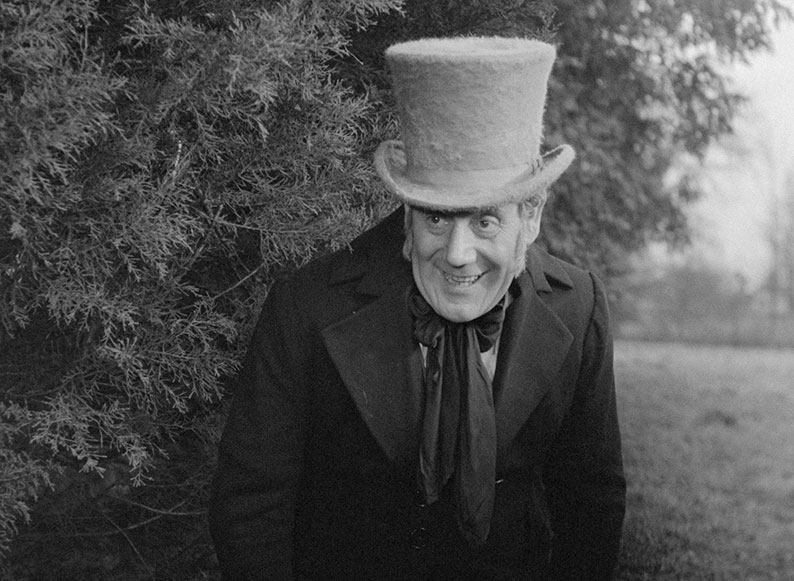
Finally, after pussy butcher extraordinaire Henry Hopkins finishes his spiel, the third and final guest is introduced, and it's none other than a tuxedo-dressed Tod Slaughter. He reflects on the number of murders he has committed on stage and screen and promotes his latest film – which is technically the one we're watching – as "a new old melodrama." He then addresses the approaching camera (this is a radio show, not TV, but we'll let that pass because it's fun) to describe the film's titular Stephen Hawke as, "As double-crossing an old villain and racketeer as ever lived. A kindly old gentleman and yet a fiend."
After eight-and-a-half minutes of prologue, the film proper finally begins, and once again Slaughter seems to be determined to push the boundaries when it comes to the creepy malevolence of his character. In the grounds of a posh estate, young Terence, the insufferably entitled child of the family that lives there, walks into the garden to play with his hoop. Lurking in the bushes is the titular Stephen Hawke (Todd Slaughter), a cheerful old man that the ghastly Terence orders off his property because his father doesn't keep a garden for nasty common people like him to look at. But the ever-smiling Hawke spins a tale about having a rare plant called a "paradoxical taradiddlum," and encourages Terence to approach him. Bloody hell, I thought whilst watching it for the first time, is Hawke going to prove to be a Victorian-era Jimmy Saville? Before we find out, the film cuts to the family housemaid sitting on the veranda, where her quiet time is disrupted by a high-pitched scream. When she, two of the servants and the boy's father find Master Terence, he is dead from a broken back, another victim of a serial killer known as The Spine Breaker who has been terrorising London.
The film then cuts to Hawke making his escape on a cart driven by his one-legged, scar-faced, hunchbacked, and eyepatch-wearing assistant, Nathaniel (played by Graham Soutten, who really did only have one leg), who observes that Hawke left in rather a hurry. "Yes," Hawke replies, "I'm afraid my artistic ability was not appreciated." Wow. It's clear from their conversation and the map we saw Hawke drawing of the house that the two were planning to rob the place tonight, but the boy's death now means it will be too well guarded. As they make their way home, Hawke amuses them both by slipping on his glasses, leaning on his cane, and adopting the friendly old man persona with which he presents himself to the world at large.
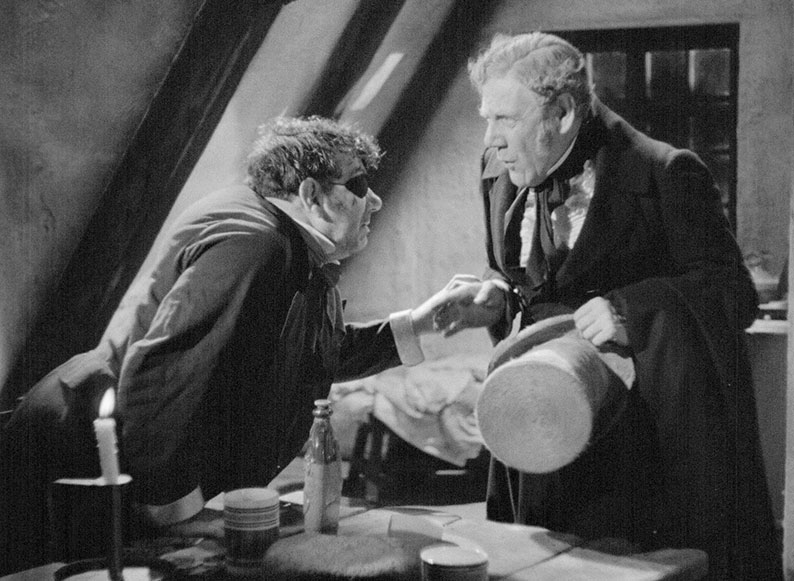
If you've thought that Slaughter could have made a belter of an Ebenezer Scrooge, The Crimes of Stephen Hawke provides all the confirmation you'll need. When we meet him next, he's no longer Stephen Hawke the Spine Breaker but Stephen Hawke the kindly old money lender, whose only concern is the welfare and happiness of his adopted daughter Julia (Marjorie Taylor). Unbeknownst to him, Julia has fallen for handsome young Matthew Trimble (Eric Portman), the son of shipping agent Joshua Trimble (D.J. Williams, playing his third protective father in the space of the first three Slaughter films), an old friend of Hawke's whose office is just across the hall from his own. Both Joshua and Matthew talk about Hawke in glowing terms, as a man whose loans enabled their business to flourish and who is the absolute antithesis of the image of a flint-hearted money lender. And when Hawke returns to his office, that's exactly the vibe that he gives off. What surprises most here after the first two films is how impressively restrained Slaughter's performance is. He gets his more expressive moments later, including the chance to use his signature cackle, but in this film we get to see as much of Slaughter the actor as we do of Slaughter the reliably colourful performer.
The Crimes of Stephen Hawke was the only Slaughter film in this set not based on an existing literary property, and it has a quartet of screenwriter credits, and a possible fifth contributor. The screenplay is credited to Frederick Hayward, with dialogue by Jack Celestin, additional dialogue by H.F. Maltby, from a scenario by Paul White. The IMDb also suggests that the opening was the work of an uncredited Tod Slaughter. The result is one of Slaughter's most wittily scripted and smartly structured movies. The plot in particular has its share of neat surprises, the first of which comes when a moment of anger on Hawke's part results in him crushing a precious statue with his spine-snapping hands. Having witnessed the finger of guilt pointed at Hawke after a wealthy guest is killed by the Spine Breaker on at a party the previous evening, this acts as worrying confirmation for Joshua. His son dismisses his suggestion that these murders could be the work of their bodily frail old friend, but when Joshua also becomes a victim of the Spine Breaker, Matthew pulls a ruse to expose Hawke for the monster he truly is. The trick is, this doesn't happen at the climax of the film as you would normally expect, but at the halfway point, triggering an unexpected change of direction for the story. For reasons Matthew has an unconvincing explanation for, he lets Hawke go with the assurance that he will hunt him down after burying his father, transforming this serial killer melodrama into a take on The Most Dangerous Game. The twists continue with a surprising ruse that Hawke later pulls to avoid being cornered by the relentlessly pursuing Matthew, while the knowledge that he is able to snap spines due to his abnormally strong hands makes his later escape from confinement feel entirely plausible.
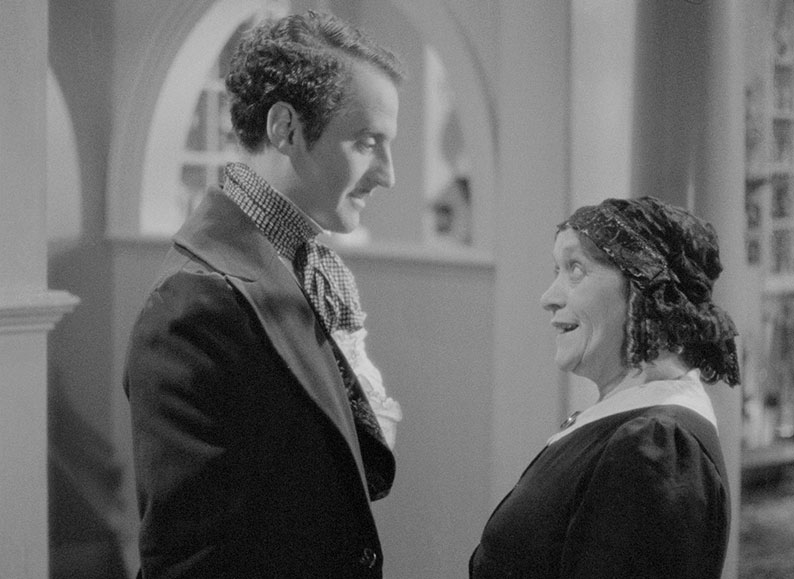
The dialogue is also livelier here than its more theatrical equivalent in previous Slaughter movies. The economical conversation that takes place between Hawke and Nathaniel as they flee following Hawke's murder of young Terence has its amusing moments. "Told you today you'd be unlucky," Nathaniel says grouchily. "Saturn's too high in the heavens," to which Hawke responds dryly, "Is it? I shall be compelled to send you there if you don't drive more carefully." As Matthew, particularly once the hunt begins, Eric Portman also gets his share of well-written scenes and makes the best of them. The manner in which he teases information from a landlord (Norman Pierce) by outbidding the bribe already given to him by Hawke is nicely handled and performed by both parties. But my favourite such sequence comes when Matthew returns from his travels and Julia tells her jovial maid Emma to inform him that she is not in. Openly keen to see the course of true love run more smoothly, Emma engages in a lovely bit of banter with Matthew in which she both obeys the instructions given to her by her mistress and clues Matthew into the deception that she's been ordered to pull. It's an absolute crime that I can find no record anywhere of the name of the actress who plays Emma, as for me she's one the film's brightest gems.
In retrospect, it's inevitable that Maria Marten and Sweeny Todd remain the films for which Slaughter is most famous, and both deserve their lasting reputation. Yet for its cast, its characters, its plotting, its dialogue, and for the breadth of Slaughter's performance, for my money The Crimes of Stephen Hawke has them both beat. This is where all of the elements that came to define a Todd Slaughter film really come together, and where his director George King really hits his stride. It's well-written, well-made, and, dammit, well-acted, and boasts a more substantial plot than its immediate predecessors, and even features a rare sympathetic demise for Slaughter's character that I found genuinely moving. It also boasts some creative lighting camerawork from budding young cinematographer Ronald Neame, who would later shoot films for Michael Powell and Emeric Pressburger and David Lean, before becoming a director of note himself with the likes of The Man Who Never Was (1956), The Horse's Mouth (1958), Tunes of Glory (1960), Gambit (1966), The Prime of Miss Jean Brodie (1969) and The Poseidon Adventure (1972). Not bad for a lad who made his debut as a feature cinematographer with the 1933 musical-comedy Happy when he was just 22 years of age.
| IT'S NEVER TOO LATE TO MEND (1937) |
|
A Tod Slaughter social issue film? Surely not. But his 1937 melodrama, It's Never Too Late to Mend, declares its intentions in a book-page opening caption, which references 19th century author Charles Reade, on whose 1956 novel It is Never Too Late to Mend this film was based. Taking its cue from its source, the film then openly declares war on the once-appalling conditions inside British prisons and the wealthy landowning class as a whole. How can you not love this man, just a little?
Slaughter himself is true to type here, cast as he is as Squire John Meadows, the local magistrate in a rural community, and a man whose duties include overseeing the management of inmates at a nearby prison. As most of the community files out of the church one Sunday, Meadows has his eye on pretty young Susan (Marjorie Taylor), the daughter of cheery parishioner, Farmer Merton, who's once again played by D.J. Williams. That makes four protective fathers in a row for the actor. Susan, unsurprisingly, is not remotely interested in Meadows, and instead is in love with good-looking George Fielding (Ian Colin), a farmer whose pauper status makes him an unsuitable match for Susan in her father's eyes. "The man who marries my daughter," the mercenary Merton tells him, "must show me first one thousand pounds," a seriously tall order in the mid-1800s. While Merton is judgementally lecturing George, Meadows is busy having his marriage proposal to Susan soundly rejected. This clearly annoys him but amuses his associate, Lawyer Crawley (Lawrence Hanray), who seems to delight in Meadows' every misfortune and who may be my favourite character in the film. A short while later, George's close friend, Tom Robinson (Jack Livesey), shocks Merton and the otherwise decent pastor Reverend Eden (Roy Russell) by strolling up to them with a whistle and the news that he has caught tomorrow's breakfast. When the pastor asks him sternly if he's aware that it's Sunday, he theatrically clicks his fingers, smiles and mockingly claims, "On my honour, I'd forgotten it." I took an instant liking to him too.
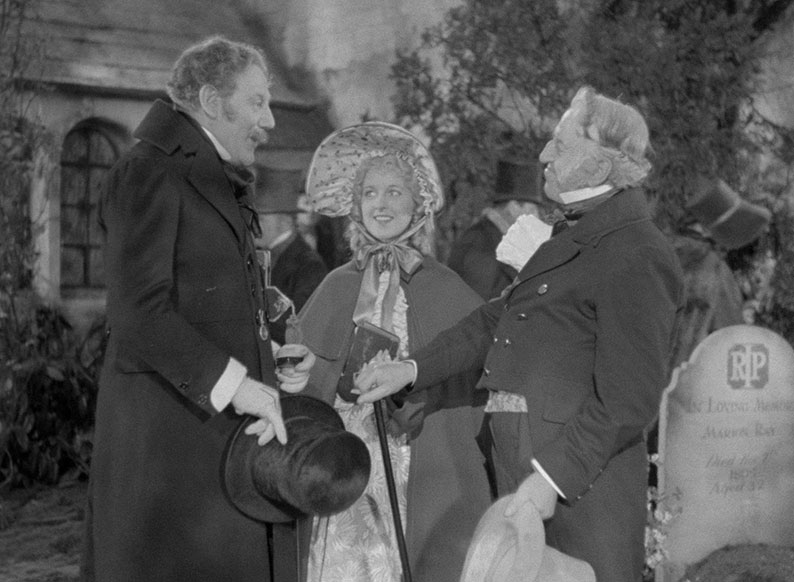
Having been politely but firmly snubbed, Meadows hatches a plan to put George out of the picture and give himself another shot at Susan. To this end, he bribes the local cops and judiciary to arrest George on the trumped-up charge of poaching on the squire's land. This, he figures, will allow him to then march in and make a show of disbelieving such a claim before George is hauled off, and remaining to comfort the upset Susan. The plan seems to be going well until Tom waltzes cheerfully in and announces that George is innocent and that he is the poacher they are looking for. He is thus arrested in George's place and marched off to prison, leaving George free to continue his relationship with Susan. The irony is that George had already decided by this point to accept a job offer from a friend to join a two-year sea voyage to Australia. If Meadows had just waited a couple of days, he could have saved a few quid in bribe money and the self-sacrificing George a trip to the clink.
The concept of the three-act drama is an old and trusted one, but rarely is this format so starkly visible as in It's Never too Late to Mend. The film certainly begins in familiar Tod Slaughter fashion, with Slaughter cast as a scheming middle-aged nobleman with his eyes on a pretty young woman, who in turn is in love with someone younger and more attractive than him. But after twenty minutes of this, the film flips to become a hard-hitting prison drama, and with George off on his antipodean adventure, Tom temporarily replaces him as the leading man. And it's punishing stuff. Thanks to years of governmental cutbacks and neglect, the crumbling, overcrowded state of modern British prisons has been brought to the fore, but even that is small potatoes when compared to the horrific conditions in the pre-reform Victorian era, and the film pulls no punches on this score.
The battle lines are drawn in the very first scene set inside the jail, as a party of Justices arrives to inspect the prisoners, and you'd be pushed to find a ghastlier collection of smugly superior aristocratic toffs. I'm sure they all have government cabinet positions today. Leading the pack and relishing the visit is Meadows, who intermittently pauses to pass comments the individual prisoners, who are lined up like exhausted and unhappy soldiers on parade. He really is a git here, pinching the cheek of a female inmate like he would a small child, encouraging a glum-looking man to smile, and causing another to wince with the line, "Getting a little more used to the cat, eh, my friend?" And no, we're not talking about a cuddly feline here.
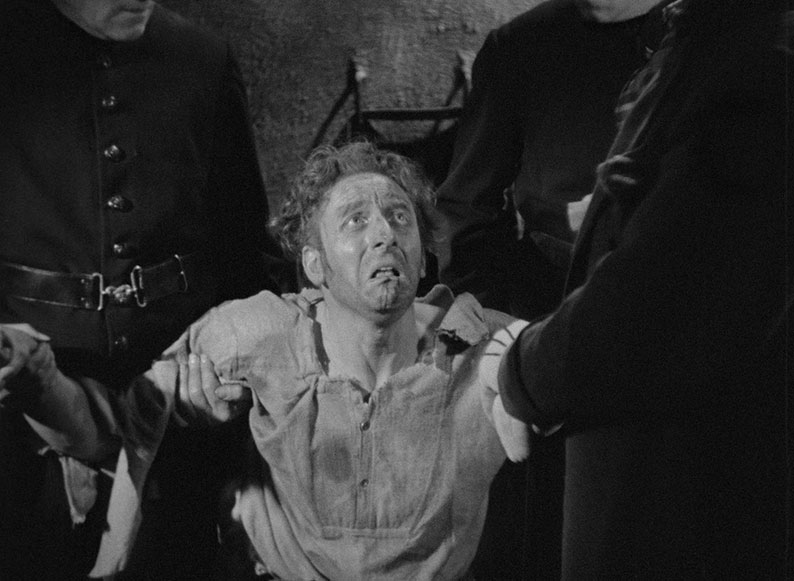
Ordered to enter the governor's office and face this collection of upper-class twats one at a time, and warned not to make even the smallest complaint, the prisoners are humiliated even further. The first one who enters is our Tom, and any hope that he has remained a cheerfully cocky thorn in the establishment's side dissolves when we catch sight of the wide-eyed, beaten down, but clearly still angry man that even a short spell in prison has transformed him into. Meadows smilingly calls for "a little discipline," and one of the toffs suggests stopping his food. That's not enough for Meadows, who orders "a few extra turns of the crank and a few hours in the black hole, and a few days on bread and water," all of which fills Tom with horror. Surprisingly, the scene doesn't end there. A female prisoner named Judith Harrows is then wheeled in and stands silently accused of unruly conduct for singing in her cell and given five days of bread and water for being "a little too full of the joys of life." There's even a fifteen-year-old boy named Joseph Matthews (Sweeney Todd's young Johnny Singer, once again terrific), who has been banged up for stealing a loaf of bread for his starving mother, who died as a result of not receiving the food. "The best thing she could do, too," says one of the Justices. "I've no patience with people who are starving." A short while later they're in a hurry to get home. "We've a six-mile drive to do," the fattest one proclaims, "and if that suckling pig is spoilt, I'll never forgive myself." Could these bastards be any more wretched? The only inmate who scores a small win here is one who crawls so humbly about the benefits of his imprisonment that he earns some privileges from the officials, who are so full of themselves that they fail to notice that he has stolen a jewelled cigarette case from under their noses.
It doesn't end there. Just as the Justices are leaving, Reverend Eden turns up to introduce himself as the new prison chaplain and is led by Meadows to the thick steel door of the bare and lightless room known as the Black Hole. It's a place Meadows gleefully describes as "the most effective of all our punishments," before waxing lyrical about the way in which breaks any man who spends even a few hours inside it. Later, we get to see prisoners working themselves into a state of potentially fatal exhaustion by turning the aforementioned crank. This may seem a fanciful invention of the filmmakers to a modern audience, but you won't have to look far to find confirmation that it was a very real hard labour punishment in its day. Indeed, the now common slang for prison warden – "screw" – originated here, being first applied to wardens who would tighten the screw of the crank to make it even harder for the prisoner to turn. This is only the beginning of the horrors that young Joseph is subjected to, and it's Eden's understandable outrage at this that casts him as the film's stand-in for source novel author, Charles Reade. It's an extraordinary midsection, one touched with melodrama but grimly rooted in historical fact. If this doesn't fire you up with righteous anger, I'm not sure what will.
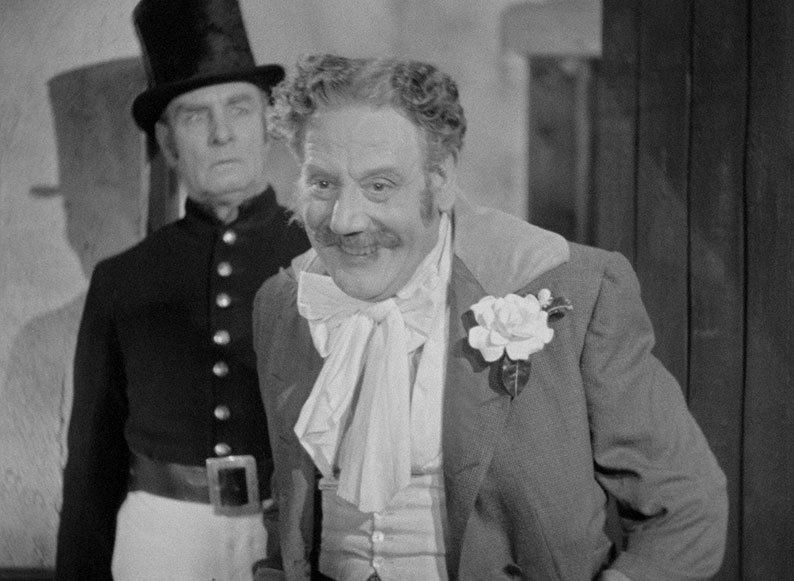
In the third act, the film returns to the Tod Slaughter melodrama formula of the opening third. The surprisingly undamaged Tom is released from prison, and the careful play that Meadows has been making for Susan's affections is potentially put in jeopardy by George's imminent return to England, having made more than enough to satisfy Farmer Merton's conditions for marriage. It all plays out as expected, but enjoyably so, with Meadows hatching a scheme to sabotage George's intentions, and Tom doing a Han Solo to come to his friend's aid. This does involve a scene whose pantomime villainy borders on the comical, as a black-cloaked Meadows theatrically creeps around an inn in order to drug George and Tom's drinks, which plays out to music that takes its cue from Mysterioso Pizzicato, the well-known 'Villain's Theme' of theatrical cliché. I could almost hear the audience hissing and booing Slaughter's every move here.
It's Never Too Late to Mend builds on elements of the first three films to cement the template for the Tod Slaughter films to come. Its midsection switch from melodrama to social commentary is bold and uncompromising, and echoes of it linger into the final third when Tom is released from prison. Nearing home, he stops off for a drink at his former local, and the patrons all walk out rather than drink in the presence of a former jailbird. The landlord then demands that he leave after finishing the single drink that the law apparently demands that he serve him. This, it turns out, is a true reflection of attitudes of the time in which the film is set and is more fully developed in the Tod Slaughter film that immediately followed.
next >>
Part 2: Films 5-8 | Part 3: Tech Specs, Special Features and Summary
|